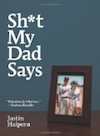They'll Make it up in Volume
The RIAA's actions make no sense on any level. Witness:
The RIAA paid Holmes Roberts & Owen $9,364,901 in 2008, Jenner & Block more than $7,000,000, and Cravath Swain & Moore $1.25 million, to pursue its "copyright infringement" claims, in order to recover a mere $391,000. [ps there were many other law firms feeding at the trough too; these were just the ones listed among the top 5 independent contractors.]
Looks like they're following the patented Jonathan Schwartz "we'll make it up in volume" strategery.





Comments
Re: They'll Make it up in Volume
[anonymous] July 14, 2010 9:57:24.323
They're not spending that kind of money just to recoup the small damages they have won. Rather, they are spending it in the belief that it prevents many tens of millions of dollars in lost music sales due to illegal sharing.
Re: They'll Make it up in Volume
[james Robertson] July 14, 2010 11:02:39.011
*cough* tens of millions of dollars *cough*
Here, I have some pristine land on the gulf coast for sale :)
Re: They'll Make it up in Volume
[anonymous] July 14, 2010 12:21:01.625
I did say "in the belief".
Re: They'll Make it up in Volume
[W^L+] July 14, 2010 23:00:07.554
Faced with a prolonged downward trend in both workstations and SPARC servers, Schwartz decided to try and make his company appealing for an IBM buyout, rather than head for bankruptcy the way SGI did. They knew that a dying hardware business could never win IBM's affections, but that IBM was pushing hard for open source (with appropriate support contracts, of course), so they tried to align with that.
As I recall, it was pricing issues that led IBM to walk away, leaving Sun to fall into Oracle's hands.
That was entirely reasonable as a business strategy when your original strategy is not likely to ever be profitable again.
On the other hand, the Robbers In Adamantium Armor (RIAA) lawsuit strategy is based around a belief that if they can misuse the legal system to suppress music-sharing, no one will have any choice but to continue to send money into their (the RIAA's) hands. It doesn't help them that (purely out of greed) they keep trying to turn against Apple's iTunes store, which is the main (paid) outlet for music purchases.
I just wish more people were willing to go RIAA-free and neither listen to, nor purchase, nor distribute any music that enriches that band of pirates.